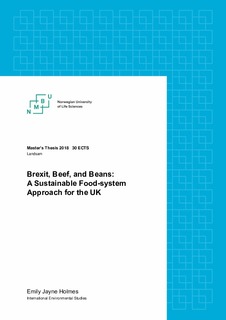| dc.description.abstract | Humans have become the leading cause of planetary changes, threatening the very earth systems that life depends on. Scientists have identified the global food-system as pivotal in both causing and addressing environmental challenges, highlighting a need to reduce global meat consumption and increase plant-based diets. Yet by fixating on dietary recommendations, much of the focus remains at an individual rather than a food-system level. However, Britain could shift the responsibility from the consumer by reshaping Britain’s agricultural production once released from European Union rules. The proposed post-Brexit Agricultural Bill (2017-2019) recommends providing financial support to farmers who promote “environmental enhancement, protection and enjoyment” (Defra, 2018b, para 20), presenting an opportunity to support environmentally friendly farming while reducing Britain’s livestock-centred farming approach. Thus, the purpose of this thesis is to address two objectives. Firstly, a literature review reveals how reducing livestock and increasing pulses would support the British government’s sustainable food-system goals by reducing emissions and fresh water use, supporting biodiversity, promoting UK citizens’ health, and furthermore would come at a time when UK consumers are increasingly ethically motivated to shift to plant-based diets. Secondly, a case study interviewing farmers in Shropshire identified potential challenges and leverage-points for this transition to take place. Discussing the past, present and future of farming with farmers provided insight on the interweaving roles that the British government, the market, and farmers’ identity play in influencing agricultural trajectory. This study found that while farmers were adaptable to changing circumstances, to encourage a shift they would need to view changes as both possible and profitable. Government has the potential to increase farmers’ confidence in pulse’s possibility and profitability by funding research on pulse-cultivation in the UK, providing financial incentives through public goods payments, and stimulating a market by serving pulses in all public canteens. Furthermore, by aligning recommendations with farmers’ appreciation of biodiversity, the government could harness farmers’ support to re-shape Britain’s agricultural trajectory. Finally, as the majority of British farmers are nearing retirement, government should encourage a new generation of pulse farmers to enter the farming profession. | nb_NO |

